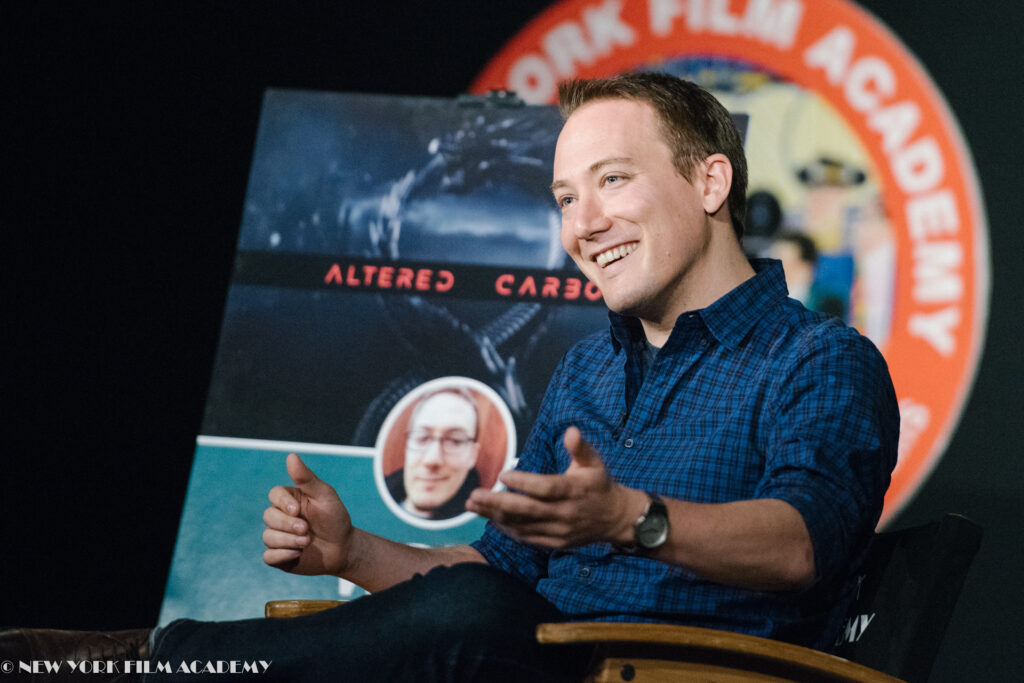The New York Film Academy (NYFA) Los Angeles recently welcomed Final Draft to the NYFA Theater for Write On: A Screenwriting Podcast. The live Q&A event featured Final Draft’s Pete D’Alessandro and writer Nevin Densham, executive story editor for Netflix’s original series, Altered Carbon.
NYFA and Final Draft, the entertainment industry’s standard screenwriting software, have a relationship that goes back many years. NYFA provides a 12-Week Fellowship for the winners of the Final Draft Big Break Screenwriting Contest, yet this was the first time that Final Draft held Write On: A Screenwriting Podcast at the NYFA Los Angeles campus.
“We’re excited to extend our relationship with Final Draft and build upon the great work we’ve done with the Final Draft Big Break Fellowship,” said Dean of Faculty and Chair of Screenwriting Nunzio DeFilippis. “Having the Write On: A Screenwriting Podcast take place at the NYFA Theater provides our students with additional networking opportunities and even more chances to gain insights from podcast guests.”
Final Draft’s Write On: A Screenwriting Podcast provides listeners with insights into writing from industry experts and professionals, and in this case the audience of NYFA students and guests from Final Draft who were able to learn more about Densham’s journey as a writer.
Before delving into writing for Altered Cabon, Densham admitted that his path into writing for television was not traditional. He grew up in Los Angeles in a household where he had the unique experience to learn from his writer, producer, director father Pen Densham.
“I was mentored from a very early age on story and a love for storytelling,” said Densham. “At the time, in the late ‘80s, a version of a hero was a man who killed other men, and he did not want me to be raised seeing that as what a hero was. A hero was a man who fought for other people even though you didn’t necessarily get what you wanted. Selfishness versus, you know, being selfless. And from a really early age, those kind of things were made really clear to me because it was just what he believed.”
Densham shared that he learned early on that it was about “thoughtful storytelling. It wasn’t just ‘hey let’s make a buck.’ It was how do you tell a story that matters? How do you do something that hopefully leaves a little good left in the world? And I was encouraged to write.”
Although the lessons from his father shaped his story sensibility, Nevin decided to leave Los Angeles to study sociology. When he returned to L.A. he had the opportunity to jump into the deep end of the pool, but he wanted to understand the business of film and television and first.
“I came back to L.A. and I wanted to roll phones,” he explained. “I didn’t know how to do that and I wanted to take notes, ‘cause I didn’t know how to do that. I didn’t know anything, frankly. I knew how to go have a meeting with a top level executive and talk and not be intimidated, but I could not answer a phone, and I knew that was a fatal flaw.”
[su_carousel source=”media: 26692,26690,26689,26688″ link=”lightbox” width=”780″ height=”360″ title=”no” autoplay=”0″]
During his time working “on a desk,” he took courses in television writing to learn the things he didn’t know. He wrote spec features and television pilots. His work got him some freelance writing jobs and an offer for a staff position, but his family friend, (and future Altered Carbon showrunner) Laeta Kalogridis told him not to take the job — but she couldn’t tell him why.
What Densham soon learned was that Laeta wanted him to join her as the story editor of Altered Carbon. Densham took a leap of faith and passed on an offer in hopes that Kalogridis’ project would come through … and it did.
Densham knew the Altered Carbon book series well, and over several months worked with Laeta to breaking down the show, learning a lot from Kalogridis during pre-production and production. He praised Kalogridis as the hardest working person, driven out of pure passion. Through her, Densham learned to not settle for something that could be better.
Densham spoke about how he approached some of his favorite spec scripts and pilots, saying that he kept giving himself permission to write it the way he wanted. This comment sparked a NYFA student to ask how far out there stories should be.
Densham responded, “My advice is to be out there to the degree you’re comfortable with, that you want to be. You have to be able to sell you. You have to be you to the most you can be, and as interestingly and effervescently or at least marketably as you can be. If I’m going to hire a writer or someone is going to hire a writer, they’re looking at not just, can they write?They’re looking at, can I bear to be with them — for hours and hours? Can I have conflict with them? You have to be you, because any kind of inauthentic you will ‘out,’ because you’re going to be working hard with a lot of people. Best to be yourself and to make that what is marketable about you.”
The final question to Densham was, what advice would you have given to yourself 10 years ago? After a moment, Densham said he would have told himself, “have a little be more faith. Have a little bit more confidence.”
His final piece of advice to himself would be to write more, be more industrious, and to know that “you don’t have to be the natural talent, you have to do it, keep doing it.”
This was the first Final Draft podcast recorded at NYFA but we look forward to hosting more in the future. Listen to the full episode of Final Draft’s Write On: A Screenwriting Podcast with Nevin Densham here.
